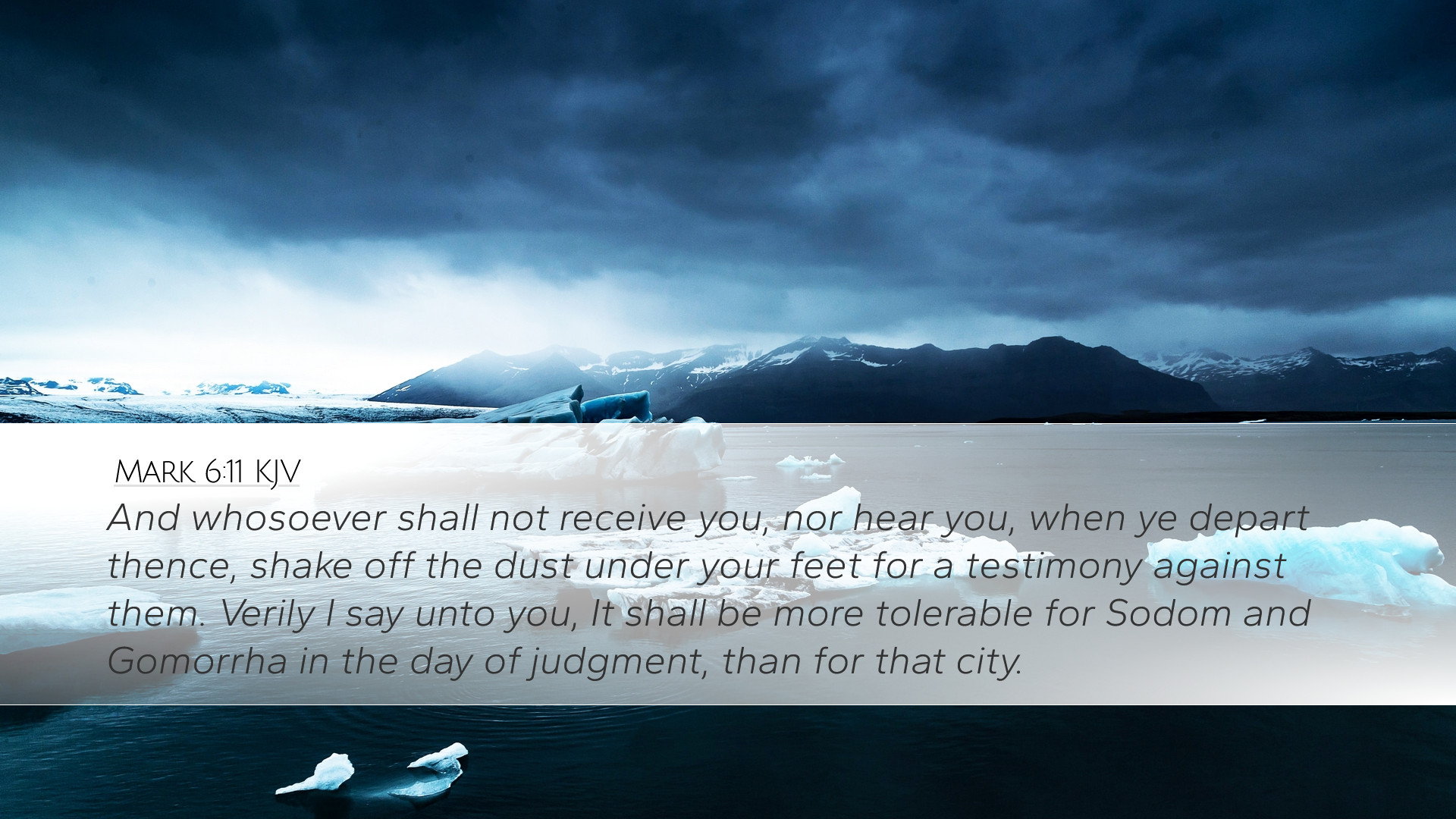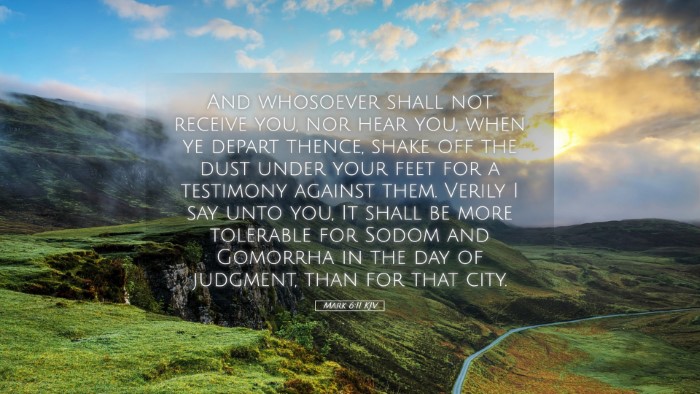Commentary on Mark 6:11
Bible Verse: Mark 6:11 - "And whosoever shall not receive you, nor hear you, when ye depart thence, shake off the dust under your feet for a testimony against them. Verily I say unto you, It shall be more tolerable for Sodom and Gomorrah in the day of judgment than for that city."
Introduction
This verse encapsulates a critical aspect of the evangelistic mission of the apostles as delineated by Jesus. In this commentary, we will explore the theological implications and practical applications of Mark 6:11 by drawing insights from esteemed public domain commentaries.
The Context of the Mission
Matthew Henry's Commentary: Matthew Henry emphasizes that this section of Mark details Jesus sending out His disciples to preach the Gospel. This mission is not merely about proclamation but also involves facing rejection. Henry remarks that the disciples are to anticipate that some will not receive them, aligning with the overall teaching of Christ that some will refuse His message.
Albert Barnes' Commentary: According to Barnes, the sending out of the disciples was part of their training. They were to test the waters of ministry. The instruction to shake off the dust symbolizes a separation and a warning that while they have fulfilled their duty, not all will accept the Gospel.
The Meaning of "Shake Off the Dust"
This phrase holds significant weight in Jewish culture. Shaking off dust was an act of disassociation, often employed when departing from a place that has rejected the message of God.
- Adam Clarke's Analysis: Clarke delves into the cultural implications, explaining that when leaving a city, the apostles were to shake off the dust to symbolize their integrity and to signify that they had left behind the guilt of that city for their rejection. This act was serious enough to denote a prophetic act of judgment.
- Matthew Henry's Interpretation: Henry notes that this symbolic gesture served as a testimony against those who did not receive the apostles, highlighting divine accountability. He connects this rejection to the broader narrative of the Gospel, where the response to God’s messengers will ultimately lead to divine judgment.
Accountability and Justice
One of the most striking aspects of this verse is the comparison between those who reject the disciples and the infamous cities of Sodom and Gomorrah.
- Albert Barnes' Commentary: Barnes elucidates this comparison by asserting that the severe fate of Sodom and Gomorrah highlights the seriousness of rejecting God’s message. Their destruction was due to extreme immorality and wickedness; thus, those who dismiss the apostles' message are likened to such grave sinfulness.
- Adam Clarke's Commentary: Clarke emphasizes that the judgment on those who reject the Gospel is profound. He posits that the weight of divine judgment corresponds to the nature of the rejection; thus, one who hears the Gospel and spurns it invites greater severity of judgment than those who lived in ignorance.
The Nature of Rejection
In the modern context, the rejection of the Gospel raises significant questions about human accountability and responsiveness to God's revelation.
- Matthew Henry's Thoughts: Henry elaborates that before the final judgment, there is a time of grace; however, persistent rejection of this grace leads to a hardened heart, resulting in severe consequences during eternal judgment.
- Albert Barnes' Perspective: Barnes points out that not all who hear the Gospel will accept it. This could be due to various factors, such as cultural values or personal biases. Still, the responsibility lies with the individual to respond to God's call.
The Seriousness of the Mission
The mission of the disciples is one that carries both privilege and responsibility. They are messengers of Christ, which augments the weight of those who bear the message.
- Adam Clarke's Insights: Clarke observes that this scripture fortifies the understanding of the apostles' role as crucial in God’s redemptive plan. Their presence in a town is a foretaste of divine grace. Thus, their rejection cannot be taken lightly.
- Matthew Henry's Conclusion: Henry reminds us that the Apostles were sent with authority. Their role as witnesses signified the urgency of their message—a Gospel of reconciliation that, upon rejection, leads to inevitable accountability.
Conclusion
Mark 6:11 serves as a powerful reminder of the serious implications of accepting or rejecting the Gospel. The act of shaking the dust off denotes not only the disciples' innocence in the face of rejection but also places the weight of consequence on those who choose to disregard the saving message of Christ. As pastors, students, theologians, and scholars reflect on this verse, they are encouraged to understand the gravity of their calling to share the Gospel, noting that their mission carries the power of redemption and the potential for judgment.
This commentary integrates insights from Matthew Henry, Albert Barnes, and Adam Clarke, drawing attention to the theological depth and pastoral challenges concerning the witness of the Gospel. It invites all to engage deeply with Scripture and empower their witness with the wisdom gleaned from these profound reflections.


